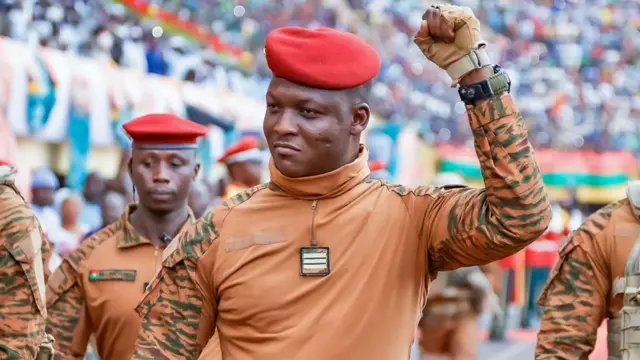Capt Ibrahim Traoré: The Rising Star of Burkina Faso
At the age of 37, Captain Ibrahim Traoré has emerged as a dynamic figure on the African political stage, captivating audiences both within Burkina Faso and across the continent. As the nation’s military leader, Traoré has skillfully crafted his image as a pan-Africanist champion, advocating for liberation from what he perceives as the oppressive grip of Western imperialism and neo-colonialism.
Resonating deeply with admirers who draw parallels between him and historical revolutionary figures like Thomas Sankara, who is often dubbed “Africa’s Che Guevara,” Traoré has ignited a movement of optimism among those weary of systemic poverty amid abundant natural resources. Beverly Ochieng, a senior researcher at Control Risks, highlighted Traoré’s widespread influence, citing praise from individuals in nations such as Kenya who proclaim, “This is it. He is the man.”
Shift in Power and Alliances
After orchestrating a coup in 2022, Traoré’s government severed ties with France, Burkina Faso’s former colonial power, and allied itself with Russia. This shift includes the deployment of a Russian paramilitary force and the establishment of policies aimed at redistributing resource wealth. Notably, the regime has introduced a state-run mining enterprise, mandating foreign companies to grant it a 15% stake in their operations and commit to technology transfers to locals.
| Aspect | Details |
|---|---|
| Coup Year | 2022 |
| Key Policies | 15% stake in mining, state-owned mining company |
| International Relations | Increased ties with Russia, strained ties with the US and France |
Controversial Popularity
Traoré’s popularity has surged, owing largely to his adept use of social media platforms, where he has garnered attention through a mix of genuine support and misleading portrayals of his image. Notably, he captured public longing for a strong leader at the Russia-Africa summit in 2023, where he urged other leaders to break free from Western influence.
His message has struck a chord, transcending geographical boundaries and attracting support from African diaspora groups. High-profile figures like rapper Meek Mill have publicly expressed admiration for Traoré, although they sometimes misstate details about him.
Criticism and Challenges Ahead
Despite his growing acclaim, Traoré has faced criticism both domestically and internationally. French President Emmanuel Macron has denounced him as part of a troubling coalition of “self-proclaimed pan-Africans” and neo-imperial interests. Furthermore, while Traoré’s government has promised to address long-standing Islamist insurgencies, it has also been criticized for stifling dissent and targeting opposition figures. Critics argue that this crackdown jeopardizes potential democratic advancements.
Rinaldo Depagne, from the International Crisis Group, attributes Traoré’s widespread support to his youthful appeal in a nation where the median age is around 18. His political acumen has also enticed those desiring an end to the traumas of war, an appeal reminiscent of celebrated past leaders like Sankara.
A Hopeful Yet Uncertain Future
As Traoré continues to captivate the hearts and minds of many, his governance remains under scrutiny. Reports indicate the economy remains resilient despite security challenges, with institutions such as the IMF and World Bank noting progress in key areas of economic reform. However, the volatile political landscape in West Africa, characterized by the recent departure of French forces from several nations, raises questions about the long-term sustainability of Traoré’s rule.
Ultimately, the captain’s future, alongside the joint efforts of military leaders in Mali and Niger, signifies a broader realignment in West African politics. As his regime projects an image of national sovereignty and self-determination, it remains to be seen whether that will translate into lasting stability and prosperity.


